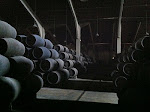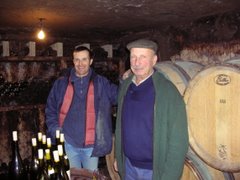Blind Tasting and Scoring 2004 White Burgundy
A friend recently hosted his tasting group and invited me as a stand-in. They were blind tasting 2004 white Burgundies, a great theme in and of itself. A difficult year in most of Burgundy, particularly for red wines. How would the whites show five years on? But the group added a fascinating wrinkle to this tasting. In addition to writing notes about each wine, we would also assign each wine a point score using a version of the 100 point scale. The idea was to test the notion that wine can be numerically rated in a reliable and sensible manner when tasting many of them somewhat quickly. There were 7 of us participating, we each brought one wine, all of the wines were served blind. Would the "best" wines get the best scores? Or would our diverse palates and preferences lead to unpredictable or inconclusive results?
We first spent some time discussing how to rank the wines. We agreed on the following method: 96-100 is a wine that is the very best of its class, and therefore quite rare. 90-95 is a wine that is exceptional, worth seeking out and buying. 85-89 is a very good wine, 80-84 is a good wine, and 79 or below is not good. We agreed not to discuss during the tasting, and we got to work. I tasted in reverse order, and I'll share my notes before revealing the wines.
Wine 7) Creamy leesy lemon cake icing, smoky. This is super extracted and huge, not a style that I care for. But it's not bad wine, there is a mineral character, and it is actually somewhat balanced considering that it seems to be going mostly for power and muscle. Showy, not elegant, but well made, and within that style it is very good wine. I scored it an 88.
Wine 6) Mushroomy earth, smoky, very mineral, delicate citrus on the nose - a gorgeously expressive nose, airy and elegant. Great texture - ample and tactile, graceful. Purity, ripe fruit, great length, piercing flavors and acidity with a perfumed finish of herbs and flowers. This wine has great core intensity without being overly extracted or ripe. I thought it was beautiful and exceptional wine, something I wanted to seek out and buy. Not at the top of that category, but not at the bottom either, so I scored it a 92.
Wine 5) Nose is mute, perhaps some minerals are hiding somewhere in there. Kind of flat on the palate too. Certainly correct wine, some citrus, some minerals, austere, good balance. But unexciting. I got involved in conversation and sat there swirling this wine for a few minutes, and this is why this whole point thing is precarious, at best. What if the critic stops here and doesn't re-visit the wine, moving instead through the remaining 35 glasses that require tasting? Five minutes later this wine was beautiful and very expressive, with deliciously clean and pure notes of citrus, stones, and flowers. Great understated acidity, great balance, and a lovely lingering perfume, this is great wine, absolutely delicious, and with an elegant and understated character. I preferred Wine 6, but if money were not a factor I would eagerly buy this wine also. I scored it a 91.
Wine 4) Reductive nose that required serious aeration, and then there is a whole lot of oak. This is not an appealing nose to me. The palate is better, with some citrus and mineral flavors, but there is nothing complex about this wine and it is kind of thin in the mid-palate. It is perfectly good wine, but I found it hard to get by the nose. I scored it an 84.
Wine 3) Reduction on the nose, again lots of aeration needed, but then reveals a lovely and focused nose of minerals, very clean and pure, with ripe but delicate citrus fruit. Good balance, a soft and almost plush texture that is lifted by good acidity, lovely herbal notes on the finish. Excellent wine, worth seeking out and buying. Without the same intensity of Wines 6 and 5, and with a bit more fat, but excellent nonetheless. I scored it a 90.
Wine 2) I thought this was flawed. Not corked, but completely wrong. Heat damaged maybe? I got nothing but resin and rubber tires on the nose, some rotting leaves. And it tasted awful too. I wasn't sure how to score flawed wine, so I gave it a 79.
Wine 1) Reductive nose, took longer than seemed reasonable to blow off - I had almost given up. But it did blow off, and revealed elegant airy mineral and herbal aromas. An intense core of lemon on the palate, good length. This is very good wine, but it is not entirely harmonious, it seems kind of herky-jerky to me. I scored it an 88.
As we discussed the wines we realized pretty quickly that everyone has their own understanding of "exceptional" and "very good," and that some tasters are extreme in their scoring, others more even-handed. We decided to drop the highest and lowest scores when calculating the average, in order to do away with some of the random noise generated by very high or very low scores. Okay, now to reveal the wines and calculate the average scores:
Wine 7) - Hubert Lignier Fixin - 86.2 avg., 88 my score.
Wine 6) - Louis Carillon Puligny-Montrachet 1er Cru Champ-Canet - 92 avg., 92 my score
Wine 5) - Paul Pernot Puligny-Montrachet 1er Cru Les Folatières - 87.8 avg., 91 my score
Wine 4) - Patrick Javillier Bourgogne Blanc Cuvée des Forgets - 88.4 avg., 84 my score
Wine 3) - Henri Prudhon Saint-Aubin 1er Cru le Sentier de Clou - 91.4 avg., 90 my score
Wine 2) - Génot-Boulanger Savigny-lès-Beaune - 82.2 avg., 79 my score
Wine 1) - Hubert Lignier St. Romain Sous le Château - 88.6 avg., 88 my score
Interesting results, I think. The wines showed very well overall, I would say. I was secretly gratified that my scores were in line with the relative nobility of the various terroir - I scored the Pulignys the highest, then the 1er Cru from Saint-Aubin, and so on, the Bourgogne lowest. Not that this should always be the case, but it felt right to me looking over the wines. It is also clear that subtle wines can be underrated in tastings like this - the Pernot wine is a good example. Also, to my astonishment, some people liked Wine 2! Half of us thought it was flawed, and some liked it, and that shows how fallible point scoring can be. If one critic is responsible for assigning a score, that person might like wines that I don't, or vice-versa.
I don't think our experiment broke any new ground, but it reminded me that the only way I find point scores useful is when I know and trust the scorer, and when I know the details about where our palates intersect and where they do not.







8 comments:
Hey BG,
Did you by any chance catch Matt Kramer's column in the most recent Wine Spectator? A Johnny-Come-Lately rundown of what you've been saying forever about the virtues of the Loire. I'd link to it here but WS doesn't make that stuff public on their site. Check it out if you get a minute.
P.S. Just to make this comment semi-relevant to this post, I respectfully disagree about the Javillier, though I'm an admitted oak junkie.
Very well written thanks very much for the information!
Sounds like a reasonably fun night.
...and I'm a big fan of Carillon. Even his Mercurey Champs Martin is amazing.
As for JBH's comment about Kramer, despite how trendy it is to diss all things big wine media, I think Kramer writes thoughtful pieces for most of his editorials. I also think that he is probably the most terroir oriented of the WS cru, the most truly old world driven, and that he has both long laid out a lot of love for the Loire and for underground and inexpensive wines.
That said, I read the piece, and it wasn't his best work. Still, I give the guy some credit. Of course, you both have a lot more love for Loire reds than I do. Whites I'm on board with.
Tasting sounded like a good time. I used to score numerically but have moved away from it of late, in my own notes or on CT, though occasionally some number really sticks in my head for a wine.
Overall I really like the '04 whites, and I have a choice few '04 reds that I hope come around some with time. Troubling vintage to say the least, but with burgundy stranger things have happened (maybe).
Though I can see how my comment suggested otherwise, I assure you I'm not a knee-jerk disser of "big wine media". Can't count the number of times I've stuck up for Parker in hostile company, and I've been a Kramer fan since I first subscribed to WS two years ago. I guess I missed his prior writings on the Loire, and just found it amusing that there was finally (or not?) mainstream recognition that Loire is a safe bet.
I haven't seen the article. I have a lot of respect for Matt Kramer though. I also know this - people might be interested in things long before they write about them. Journalists have all sorts of weirdness that governs their schedules.
This tasting was a load of fun, and thanks Trevor. Alex - I've seen that wine but I cannot get my head around paying that much for Mercurey. Even if it is Carillon. The Puligny Villages isn't really that much more.
MichaelP - the whites I believe in for the most part. I hear really bad things about the reds now, but i haven't had the cohones to explore my own bottles yet. Soon., I'm thinking. The single most expensive bottle of wine I own is a 2004 red burg.
BG, I can relate, some of my more expensive bottles are '03 red burgs, plagued with their own problems, but I hope that the burgundy mantra of producer-first rings true.
I have had mixed results with my 04 reds, with none of the horror that some describe. Overall I think all of my '04, even the basic bourgs, will benefit from some more time.
Post a Comment